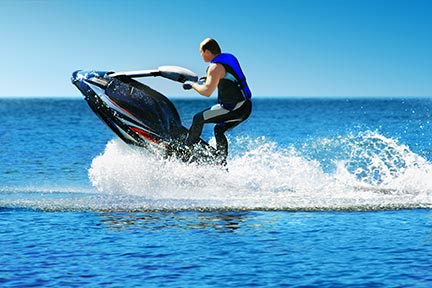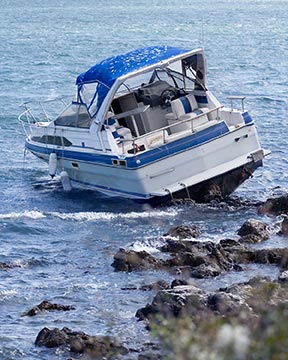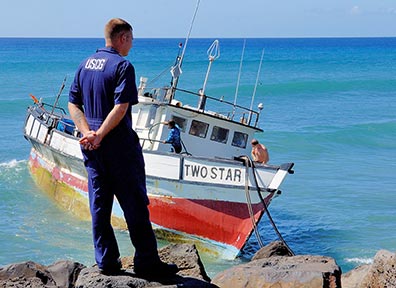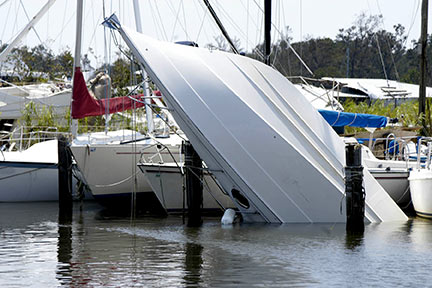Little Rock Accidents Lawyer | Ski Boat Accident Lawyer | Fishing Boat Accident Attorney | Lake Boat Accidents
Every year thousands of Little Rock and Pulaski County citizens plan a trip to go boating or swimming with their friends on a lake or river in Arkansas. Most of the time, their trip creates life long memories. Unfortunately, not every trip to the lakes around Little Rock ends happily. If you or a loved one have been injured in a boating accident, contact a boating accident attorney immediately because you only have two years from the date of injury to file your claim. A Little Rock boat accident lawyer will look out for your interests and provide you with advice on the best course of action.
What are the common causes of boating accidents?
1. No Brakes
Unlike cars, boats and jet skis do not have brakes. Once they are in motion they can only maneuver to avoid an accident. Though some boats have an option to reverse causing a lesser speed at impact, the accident still occurs. Often though, by the time the people involved in the accident realize what is about to happen it is too late to prevent it.
2. Alcohol and/or Drugs
One of the largest factors in boating accidents is alcohol. It is well documented that a person’s reaction time is hindered when under the influence of alcohol. According to BOAT US, in fact, alcohol plays a role in 50% of all boating accidents. In Arkansas, laws similar to those governing drinking and driving apply to incidences of drinking and boating. The state enforces the Boating While Intoxicated (BWI) law, and any person who appears impaired by alcohol use and/or who has a blood alcohol level (BAL) of 0.08 or above while operating a boat can be arrested for BWI. An arrest for BWI can carry up to 1 year in jail, a fine up to $1,000, or both. The bottom line is that the State of Arkansas will not tolerate boater recklessness, especially when drinking is involved.
3. Alcohol & Sun Exposure
In addition to drinking, many boaters fail to take into account that they will be out in the sun all day. As a result, they are more likely to become drunk from less alcohol due to the dehydration from the sun. The best way to ensure a safe boating experience is to have the person driving the boat not drink alcohol. Boating and drinking do not mix!
4. Weather
Another common cause of boating accidents is the weather. While Arkansas generally has ideal, sunny weather, when you are out on the water a small storm can easily lead to tragedy. The combination of high winds, rain water, and swells of the waves or wake from other vessels can easily lead to boats colliding or turning over. It takes an experienced boater to be able to weather a storm in a boat. In addition to storms, the sun reflecting off of the water leads to increased chances of boaters to suffer from heat stroke and heat exhaustion. When suffering from heat stroke or exhaustion a common symptom is to faint and if the boater is boating alone then while he is unconscious there is an unmanned vessel on the water. Obviously, this can lead to serious injury.
5. Inexperienced Boaters
Finally, the most common cause of boat accidents are inexperienced boaters being put into dangerous and unfamiliar situations. Similar to the road, the waterways have rules that govern how boats are supposed to interact when passing one another. When one person fails to know these rules it can easily lead to boating accidents. To learn these rules, every boater should take a boater safety course. Click here to go to the Official Arkansas Boating Safety Course, developed for the Arkansas Game and Fish Commission.
There is no excuse for a person that plans to man a watercraft not to take a boater safety course. Some of the courses only charge if you successfully complete the course. On top of that, the course will likely pay for itself because, after certification, you can talk to your boat insurance company about lowering your boat insurance premiums.
Principles of Safe Boating:
- Wearing life jackets save lives.
- Designate a driver. Sober boating saves lives.
- Boater Education saves lives.
- Safe boats save lives.
Who is responsible and what can I recover if I hire a Little Rock Boat Injury Lawyer?
Typically the person who caused your injury is who your Little Rock Boat Accident lawyer will sue to make you whole. Under Arkansas law, a person is responsible for your injury if they acted negligently. It is important to contact a Little Rock boat accident attorney or Pulaski County boat injury lawyer because, depending on the facts of your boating injury, you may be able to sue other parties in addition to the person who was driving the boat.
If you have suffered an injury due to another person’s negligent boating, your Little Rock boat accident lawyer can recover for the following damages from the negligent boat owner or operator:
- Medical bills and/or funeral costs
- Cost of any therapy
- Cost of long-term care
- Property damage
- Loss of income
- Pain and suffering
Injuries arising from Jet Ski, Skiing, Races, Regattas and Unsafe Operation
As a state with so many boaters, Arkansas has an extremely comprehensive statute governing boating and water safety. To read the full text of the Arkansas Boating Laws (Title 27, Sub-Title 7), click here.
Call a Little Rock Lake Boat Injury Lawyer or Little Rock Fishing Injury Attorney Today
Many boating accidents occur at night when people are coming in after fishing all day. Unfortunately, many times they do not want to end their fun, and they stay out on the water well past dark, creating a more dangerous boating situation. Too many times, small fishing boats are not equipped with running lights or radar, causing collisions between boats. Injuries sustained in these collisions can be very dangerous and can sometimes also result in a drowning. This is especially true because people dislike wearing life preservers, or personal flotation devices (PFDs), and if you are knocked unconscious, this can easily cause you to drown. If you have suffered an injury as a result of another boater’s failure to properly follow the rules and regulations required by Arkansas law, contact a Little Rock boat accident law firm.
Duck Boat Injury Lawyer
If you are a duck hunting enthusiast, then there is nothing better than getting in your duck boat and taking it out for a hunting trip. As a duck hunter, you know that the sport presents numerous risks for injury, ranging from gun misfires to accidental shootings. In addition to the regular dangers of hunting, duck hunting adds to the equation a large list of boating dangers, such as running the boat aground and boat collisions. If you have to utilize a boat to get to a blind and someone is injured in the boat due to the driver’s negligence of the, contact a Little Rock duck boating incident lawyer today.
What do I do if I am involved in a boating accident or witness an accident?
If you have been in a Southeast Arkansas boating accident, you must stop and provide whatever assistance is necessary to the victims of the accident. This duty, however, does not require you to provide assistance that will place your boat or its passengers in danger.
After a boating accident, you should also give the other party some basic information that will help in any later dealings. This information should be given to any individuals injured in the accident, the boat owner, and the owner of any property damaged in the accident, and should include, at the least:
- Your name
- Your address
- Your Certificate number
Also, you should always report any significant accident to the Arkansas Game and Fish Commission or the local Sheriff's department. A significant accident would include situations where there is a death, a disappearance suggesting serious injury or death, bodily injury to at least one party requiring medical attention beyond simple first aid, or property damage over $500, including damage to surrounding docks or boats. As soon as possible, you should submit an accident report. Call 1 (800) 482-9262 to file a report.
If you have to report a boating accident please contact a boating accident lawyer to assist you in preparing the forms that Arkansas law requires you to fill out to ensure that your interests are protected.
 Does Arkansas law require me to have any specific equipment on my boat?
Does Arkansas law require me to have any specific equipment on my boat?
Arkansas requires safety equipment for boats on its waters. Additionally, boats entering Federal waters must follow Federal safety standards. Read more about specific requirements in the Arkansas Boating Handbook.
Fire Extinguishers
In Arkansas, boats must carry Fire Extinguishers if they enter Federal waters. Read more about fire extinguishers here.
Lifesaving Devices - Personal Flotation Devices (PFDs)
PFDs must be U.S. Coast Guard approved, in serviceable condition, readily accessible, and of the proper size for each person on the boat. Children under 12 years old in any vessel must wear a U.S. Coast Guard approved PFD while underway. Underway is defined as not at anchor, made fast to the shore, or aground. All vessels, including canoes and kayaks, must be equipped with PFDs. Vessels 16 feet and longer, except for canoes and kayaks, must be equipped with a particular type of PFD for each person on board. Specific rules and restrictions apply to the use of inflatable PFDs. For a full explanation, including instructions for boats on Federal waters, please consult the Arkansas Boating Handbook.
Observers and Mirrors
Every vessel towing a person on water-skis must have an observer, at least 12 years old, other than the operator to watch the person being towed. Furthermore, the PWC must be rated to carry 3 people (the operator, the observer, and the skier). Boats, but NOT personal watercraft, are exempt from needing an observer if they possess a wide-angle, convex, marine rear-view mirror in a position to observe the skiers being towed.
Navigation Lights
When not at dock, all motorized vessels must have and display at least one bright light, lantern, or flashlight visible all around the horizon from sunset to sunrise in all weather and during times of limited visibility. Click here to read further requirements for boat navigation lights.
Sound Producing Devices
Vessels are encouraged to have sound producing equipment on state waters. Federal law requires such devices when entering Federal waters.
Flame Arresters (Backfire Flame Control)
Gasoline engines encouraged to be equipped with an acceptable means of backfire flame control. This is required when entering Federal Waters. The flame control device should be properly attached to the air intake with a flame-tight connection. On Federal waters, the device must be U.S. Coast Guard approved or comply with SAE J1928 or UL 1111 standards and marked accordingly.
Exhaust Water Manifold; Muffler
All motorboats in Arkansas are strongly encouraged be equipped with an exhaust water manifold or a factory type muffler installed on the engine.
Click here for a full explanation of Arkansas Safety Requirements for Vessels.
Some of Arkansas’s Many Water Bodies
| Lake Atalanta | Beaver Lake | Bull Shoals Lake | Lake Catherine | Lake Dardanelle | DeGray Lake | DeQueen Lake |
| Dierks Lake | Lake Georgia Pacific | Gillham Lake | Greers Ferry Lake | Lake Greeson | Lake Hamilton | Lake Jack Lee |
| Millwood Lake | Nimrod Lake | Norfork Lake | Lake Ouachita | Seven Devils Lake | Winthrop Rockefeller Lake | Galla Lake |
| Lake Columbia | Lake Conway | Lake Erling | Lake Fayetteville | Lake Fort Smith | Lake Maumelle | Lake Monticello |
| White Oak Lake | Antoine River | Arkansas River | Bayou des Arc | Bennetts River | Black River | Boeuf River |
| Buffalo River | Cache River | Caddo River | Cossatot River | Current River | Eleven Point River | Fourche La Fave River |
| Illinois River | Kings River | L'Anguille River | Little Antoine River | Little Black River | Little Buffalo River | Little Cossatot River |
| Little Maumelle River | Little Missouri River | Little Red River | Little River | Little Strawberry River | Maumelle River | Mississippi River |
| Mountain Fork | Mulberry River | North Fork River | Ouachita River | Petit Jean River | Poteau River | Red River |
| Rolling Fork | St. Francis River | Saline River | Spring River | Strawberry River | Sulphur River | Tyronza River |
|
The Arkansas Game and Fish Commission’s Boating & Fishing website has extensive information regarding boating and fishing laws, requirements, safety practices, and more. Click here for online guide to Arkansas boat registration.
Arkansas Game and Wildlife Commission - Headquarters |
Additional Little Rock, AR Boating ResourcesU.S. Coast Guard - Boating Safety United States Code Title 31 – Chapter 34. Inland Navigational Rules (33 U.S.C. 34) Code of Federal Regulations, Title 46 Part 25 – Requirements
|
|
|
The Arkansas Boating Statutes set for rules governing boater education, required safety equipment for personal watercraft, operation of vessels and minimum age requirements, Arkansas boat registration and title requirements, transfer of vessel ownership, requirements for boat identification, boat certificate fees, operation of a boat in another state, and abandonment or destruction of a boat or vessel. Additionally, they explain what safety equipment is required on all Arkansas boats, mandatory vessel inspection by Arkansas game wardens and other peace officers, accidents and casualties related to boating, and the duty to stop and render aid. Finally, the laws set forth penalties, punishments, alcohol and intoxication offenses, and a number of other provisions relevant to all Arkansas boat owners or injury victims.
Duty To Stop & Render Aid
Under the Arkansas Water Safety Act, the operator of any vessel that becomes involved in a boating accident must stop and render whatever assistance is necessary unless such action would endanger his own vessel, crew, or passengers. Additionally, the operator must give his or her name, address and vessel identification number in writing to any injured person and to the owner of any damaged property. If a driver fails to comply with this provision in an accident that results in death or serious bodily injury, the driver may be punished.
To read the full text of the Arkansas Boating Laws (Title 27, Sub-Title 7), click here.
Personal Injury Lawyers Serve Little Rock and Surrounding Cities
Serving clients throughout Central Arkansas, including Adams Field, Agusta, Arkadelphia, Batesville, Beebe, Benton, Cabot, Clarksdale, Clarksville, Conway, Dumas, England, Fordyce, Forest City, Hope, Hot Springs, Iron Springs, Jacksonville, Little Rock, Malvern, Mayflower, Mena, Morrilton, Nashville, Pine Bluff, Russellville, Searcy, Sheridan, Spadra, Waldron, Warren, and other communities in Pulaski County.
Contact a Little Rock Recreational Boating Accident Lawyer today for a free initial consultation regarding your boat or jet ski accident.
